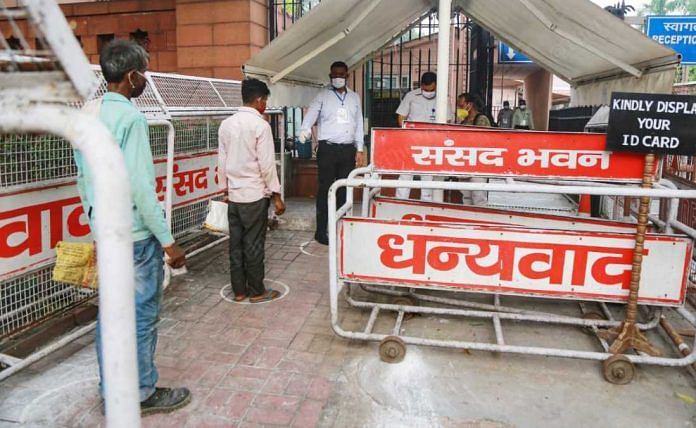New Delhi: Several traditions, formal and informal, were absent as Parliament convened the monsoon session Monday in the middle of a raging pandemic.
The extraordinary session saw masked MPs addressing the House while continuing to sit, a maximum of two members in one bench, with a polycarbonate sheet in between, and MPs staying away from the well, where members often converge in protest.
The Lok Sabha met in the morning for four hours and the Rajya Sabha in the afternoon. The MPs of each House are being accommodated in both chambers, and hence the different time-frames for operations. The seating arrangement led some MPs to joke that the Covid pandemic has given Rajya Sabha MPs a chance to sit in the Lok Sabha and vice versa.
The galleries, usually reserved for family members and the media, are also being used to seat MPs to honour social-distancing guidelines.
Also Read: FM Sitharaman budgets Rs 1.67 lakh crore of extra expenditure, mostly for Covid package
Hustle-bustle missing
The usual hustle and bustle that marks the first day of a session was missing Monday. On account of the social-distancing norms in place, treasury-bench MPs weren’t seen crossing the aisle to greet opposition colleagues, or whispering into fellow members’ ears during the House proceedings.
The attendance was good at the Lok Sabha, while the Rajya Sabha, also known as the House of the Elders, was sparsely attended, with many older members staying away.
The usual activity may have been missing, but there was more than one tense moment in the House. For example, objections were raised when Trinamool Congress MP Saugata Roy made a remark about the appearance of Finance Minister Nirmala Sitharaman.
Following a vociferous protest by Parliamentary Affairs Minister Pralhad Joshi, Roy’s remark was expunged from the record.
The Lok Sabha also witnessed opposition MPs raising questions over the suspension of question hour — a decision announced by the government earlier this month.
While the government claims it did away with question hour because it would require more staff in the House and thus defeat social-distancing guidelines, opposition MPs, including Congress’ Adhir Ranjan Chowdhury, said the decision amounted to “strangulation of democracy”.
Other changes in this Parliament session include a curtailed Zero Hour — where members raise matters of public interest, but the minister concerned is not obligated to respond — and no private members’ bills.
In another first, both the Houses will also meet on weekends to ensure MPs don’t leave Delhi. There will be no break in the 18-day session.
Also Read: 92% Covid patients in India are asymptomatic, Health Minister Harsh Vardhan tells Lok Sabha
A new way of working
The seating arrangement has undergone many changes. For one, only 50 per cent of each party’s members were allowed in the main chamber during proceedings, while others tuned in from the other areas.
Four 85-inch display screens were placed in each chamber and another six measuring 40 inches in the four galleries to enable members to watch the proceedings conveniently.
Besides this, all the seats in the galleries have been fitted with consoles to enable participation of members from their seats. Special cables have been laid to connect the two chambers for seamless participation.
The Covid-19 protocol requires MPs to change the way they work too. Generally used to carrying a bunch of papers in their bags, many MPs in the Lok Sabha had to go paperless in light of an advisory that members carry digital notes.
So, while expressing his opposition to the Farmers’ Produce Trade and Commerce (Promotion and Facilitation) Bill 2020 — which seeks to afford barrier-free trade outside of designated mandis — Gaurav Gogoi of the Congress used his smartphone to read some points of the legislation.
In another first, MPs registered their attendance digitally using the “Attendance Register” App.
Among either rules, members have been asked to remain seated, instead of standing up, while making addresses.
Some members in the Lok Sabha looked uncomfortable addressing the House while seated. Congress leader Adhir Ranjan Chowdhury was ticked off by Lok Sabha Speaker Om Birla when he got up more than once to make his point.
In the Rajya Sabha, too, chairman M. Venkaiah Naidu ticked off a member when he left his seat. “You cannot leave your seat and go to another seat for the next 18 days. You can go wherever you like after that,” Naidu said.
In the upper house, pens were changed after each new member who was sworn in signed the official documents. The members who took oath included Jharkhand Mukti Morcha (JMM) leader Shibu Soren, and Tiruchi Siva of the Dravida Munnetra Kazhagam (DMK).
Biju Janata Dal (BJD) MP Bhartruhari Mahtab, who attended the Lok Sabha session, described the session as a “one-of-its-kind experience”.
“Most members were conscious and adhered to the social-distancing norms, although there was some shouting by MPs over the statement of Union Health Minister Dr Harsh Vardhan on Covid-19,” Mahtab told ThePrint over the phone.
But, Mahtab said, members will slowly get adjusted to the new work culture. “By and large, it was a productive first day. Two bills were passed. The only flip-side was the suspension of Question Hour,” Mahtab added.
The two bills that were passed are the National Commission for Homoeopathy Bill 2020, to promote quality homoeopathy education, and the National Commission for Indian System of Medicine Bill, 2020, which seeks to create a world-class system for education in Indian systems of medicine.
Also Read: What is Question Hour, and why opposition MPs want it back in Parliament’s monsoon session



